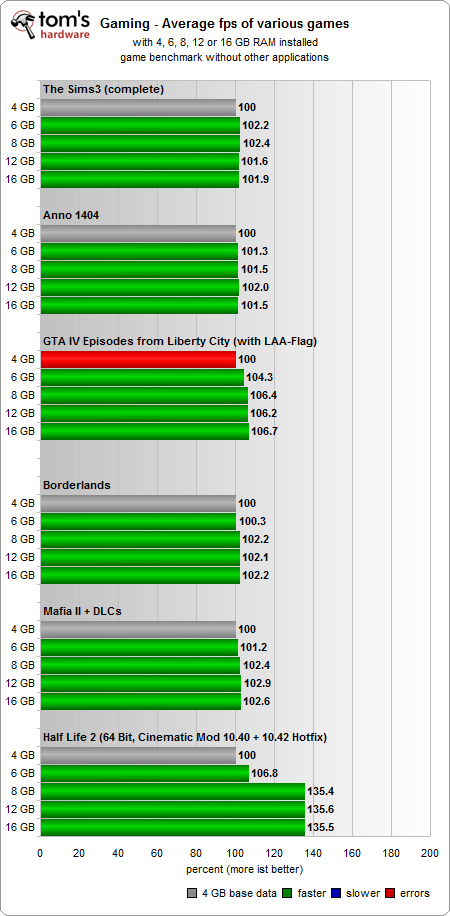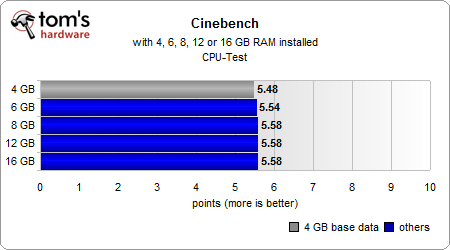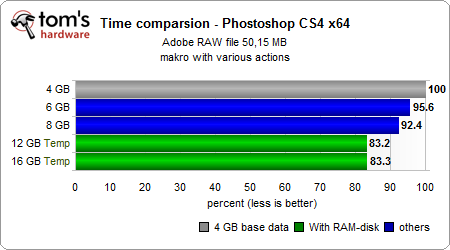Memory Upgrade: Is It Time To Add More RAM?
The price of memory upgrades is at an all-time low. And more memory is always better, right? We decided to analyze whether or not now could be the time for a fat memory upgrade. As it turns out, there are arguments for and against backing up the truck.
Get Tom's Hardware's best news and in-depth reviews, straight to your inbox.
You are now subscribed
Your newsletter sign-up was successful
64-Bit: Benchmarks With 4 GB To 16 GB
Part 1: Gaming
Older, single-threaded, 32-bit applications benefit very little from large expansions of system memory when only one application is running. We know from previous benchmarks and articles that 32-bit games running in 64-bit environments don't benefit much (sometimes at all) from system memory sizes above 4 GB, at least not in terms of frames per second.
Another rule is that an increase in performance can only be seen when a) less data is transferred between the RAM and the swap file or the data is transferred faster and b) when the writing and reading of temporary files is extremely fast. This brings us back to our earlier 32-bit discussion. Using a RAM disk can shorten load times significantly, but it doesn't really impact the actual frames per second. Also, giving the graphics card more allocable memory is likely to impact your subjective perceptions. Unfortunately, this acceleration cannot easily be quantified.
We tested the games one more time. Using the 4 GB of RAM test results as a reference point for the 100% mark, we calculated the individual relative percentage values using higher memory capacities to get a better overall comparison.
So far, so annoying. Other than the 64-bit client of Half-Life 2 with the Bombast mod installed, hardly any game sees an increase in frames per second using more RAM. The increased amount of system memory allocable by the graphics card noticeably decreases the number of visual artifacts in GTA IV. Load times could be shortened if the temporary directories were relocated to a RAM disk.
Here, however, you have to weigh what is more meaningful: running the entire system equally fast from an SSD or creating a RAM disk that requires at least 12 GB of RAM in order to be useful.
Part 2: Applications
Get Tom's Hardware's best news and in-depth reviews, straight to your inbox.
We only expect to see performance increases when programs are able to allocate and, more importantly, need more memory space. Only then can you avoid the swap effect and the performance impact we described earlier. This can also be somewhat alleviated with an SSD. We therefore only expect a jump in performance when the amount of RAM needed is nearing the amount that is installed. In the following charts, we see two examples with measurable, though small, improvements.
The synthetic benchmarks don't show any significant performance advantage, so we decided not to create a lot of pointless charts with identical bars. The fact is that a good-sized RAM disk provides a better performance increase than having more memory once you cross a minimum threshold.
At this point, we want to refer to our 32-bit benchmark results, as they're also valid for the 64-bit equivalents. However, in terms of usability on multitasking systems, we'd say that 8 GB of RAM is the minimum, even when not factoring in system memory used by the graphics card. If necessary, 6 GB will do as an interim minimum for enthusiasts in triple-channel systems.
Current page: 64-Bit: Benchmarks With 4 GB To 16 GB
Prev Page 64-Bit: Swap File Next Page Summary And Recommendations
Igor Wallossek wrote a wide variety of hardware articles for Tom's Hardware, with a strong focus on technical analysis and in-depth reviews. His contributions have spanned a broad spectrum of PC components, including GPUs, CPUs, workstations, and PC builds. His insightful articles provide readers with detailed knowledge to make informed decisions in the ever-evolving tech landscape
-
doyletdude Hmmm... i'm concerned because i use triple channel so i'm currently at 6gb, which is under recommendation however to upgrade to 12gb might be to much, especially since i've heard that using more RAM slots negativley affects overclocking stability.Reply -
hmp_goose I, too, run an X58 chipset, with Win7-64, and don't know what this article is telling me . . .Reply -
holygigi Finally a good read on Tom's, not a news about a rumor that a fruit company might provide a tease about something shiny.Reply
I use 8GB for about 2 years now, the best thing about it (and I didnt find this covered in the article) is that alt+tab-ing out from a game to windows and back to the game is almost instant. Even the hungriest game uses about 3-3.5 GB. Windows again about 2.5. So you always have 2GB free. Even though I dont have a SSD yet, after the initial slower start of an app (browser, anything), going back to it is instant. For me this is the real benefit of having more ram. The marginal (if any) FPS increase is not the main selling point. Multi-tasking is. -
takeapieandrun Personally, I would say 6GB is nice balance between capacity and cost. 4GB of RAM can become limited at times, but IMO 8GB is a little too much.Reply -
dogman_1234 Nice article. I finally learned something i can be able to use later in my computing life.Reply
My questions are as followed:
1) I am aware SSD's are a applied RAM set. So how can one use your system RAM to store files after shutdown as well.
2) How can one add more memory to the GPU? I can see a noticeable jump in GPU RAM, or GMP as they put it. -
coffee_man i use triple channel but i only got 3 gb of ram, is better to add more ram or buy an ssd ?Reply -
Niva Come on guys, the article and recommendation are pretty straight forward. They're recommending a minimum of 8 Gb and if you have less you might want to consider upgrading.Reply
That being said, if all you do is interwebs and some gaming you should be careful where you spend your money. Big ram is for programs that use a lot of ram, if you're doing heavy 3d modeling/animation, large photoshop files now that CS5 actually has 64 bit products it's justified. For games it's a crapshoot.
I say stay with 6 Gb unless you see your ram usage over 50% regualrly. -
quizzical So basically, the conclusion is that slow hard drives are slow, which really doesn't say anything about system memory. What happens if you try running the programs off of a good SSD? Having an SSD in your system, but not putting any programs or even the swap file on it seems like a rather strange configuration.Reply


